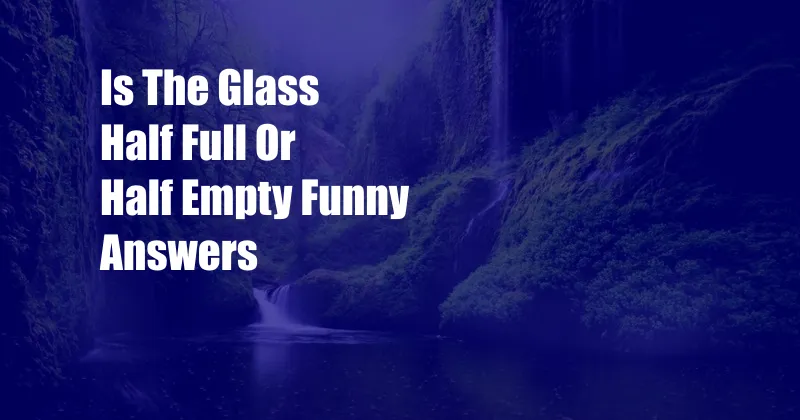
Is the Glass Half Full or Half Empty? Funny Answers to a Philosophical Conundrum
Have you ever wondered whether the glass is half full or half empty? This age-old question has sparked philosophical debates for centuries, but it can also provide a lot of comedic material. Here are a few funny answers to this timeless question:
If the Glass is Half Full…
- It’s a cause for celebration! Time to raise a toast to all the good things in life, no matter how small.
- It means you’re an optimist who always sees the silver lining, even when it’s just a tiny speck of glitter.
- You’re a dreamer who believes in the possibility of endless refills. Drink up!
Where the Glass is Half Empty…
- It’s a sign that you’re a realist who understands the harsh realities of life. Better to expect the worst and be pleasantly surprised than to be disappointed.
- It means you’re a pessimist who always sees the glass as half empty, even when the water is overflowing.
- You’re a worrier who constantly frets about what might happen, even if it’s just a tiny splash of water.
A Deeper Dive into the Glass Half Full vs. Half Empty Debate
The “glass half full or half empty” conundrum is a classic example of a cognitive bias known as the negativity bias. This bias causes us to pay more attention to negative information than positive information. As a result, we may be more likely to see the glass as half empty, even if there is objectively more water in the glass than air.
This negativity bias can have a significant impact on our lives. People who tend to see the glass as half empty may be more likely to experience depression, anxiety, and other mental health problems. They may also be less likely to achieve their goals and live happy and fulfilling lives.
On the other hand, people who see the glass as half full are more likely to be optimistic and resilient. They may be more likely to bounce back from setbacks, pursue their dreams, and live happy and fulfilling lives.
Tips for Seeing the Glass Half Full
If you tend to see the glass as half empty, there are a few things you can do to change your perspective:
- Focus on the good things in your life. Make a list of all the things you’re grateful for, both big and small.
- Challenge your negative thoughts. When you find yourself thinking negatively, try to challenge those thoughts. Ask yourself if there is any evidence to support those thoughts. Are you really as bad as you think you are?
- Surround yourself with positive people. Spend time with people who are optimistic and supportive. Their positive energy can rub off on you.
- Practice gratitude. Take some time each day to reflect on the things you’re grateful for. This can help you to focus on the positive aspects of your life and appreciate the good things you have.
Expert Advice on the “Glass Half Full vs. Half Empty” Debate
According to Dr. Martin Seligman, a leading researcher in the field of positive psychology, “Happiness is not the absence of negative emotions, but the ability to experience positive emotions despite negative ones.” In other words, it’s not about ignoring the bad things in life, but about focusing on the good things and finding ways to cope with the bad things.
Tony Robbins, a world-renowned life coach, says, “If you want to change your life, you need to change your perception.” In other words, if you want to see the glass as half full, you need to change the way you think about it.
FAQ on the “Glass Half Full vs. Half Empty” Debate
Q: Is there a right or wrong answer to the “glass half full or half empty” question?
A: No, there is no right or wrong answer to this question. It is simply a matter of perspective.
Q: Why do some people see the glass as half full while others see it as half empty?
A: There are many factors that can influence how we see the glass, including our personality, our experiences, and our current circumstances.
Q: Does the “glass half full or half empty” question have any real-world implications?
A: Yes, the way we see the glass can have a significant impact on our lives. People who see the glass as half full may be more likely to be happy and successful than those who see it as half empty.
Conclusion
The “glass half full or half empty” question is a fun way to explore our own perceptions and biases. Whether you see the glass as half full or half empty, the important thing is to be aware of your own perspective and how it affects your life. If you tend to see the glass as half empty, there are things you can do to change your perspective and see the world in a more positive light.
Would you say you’re more of a “glass half full” or “glass half empty” person? Let us know in the comments below!